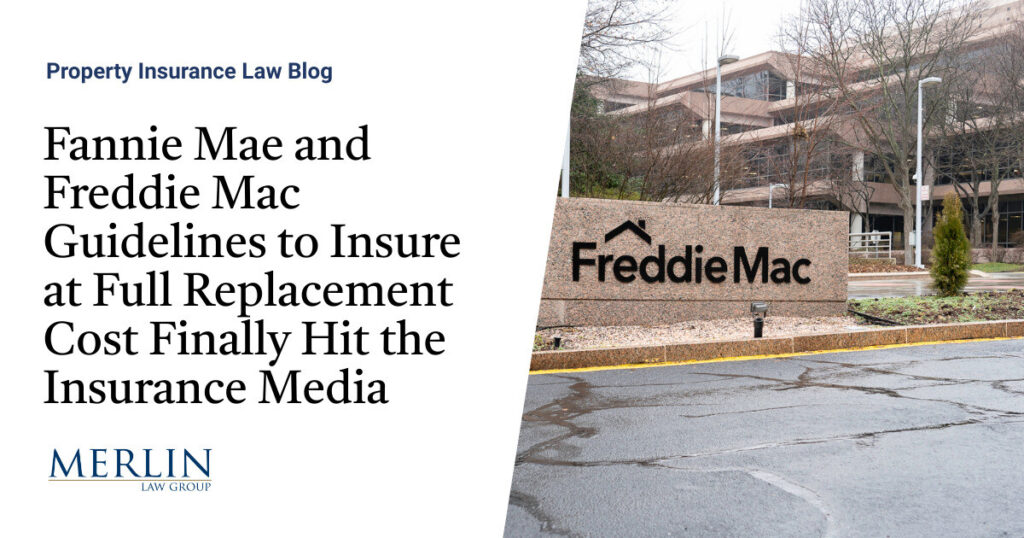Fannie Mae and Freddie Mac Guidelines to Insure at Full Replacement Cost Finally Hit the Insurance Media

The Insurance Journal article written by William Rabb, Update: Fannie Mae Guidelines Raise Concerns, Could Bar ACV Coverage for Homes, has reported and highlighted the problem of actual cash value policies violating mortgage requirements. The article noted:
An updated guideline from Fannie Mae, if it stands, could throw a wrench into the property-casualty insurance industry’s move toward actual cash value for more homeowners and condo coverage.
A Fannie Mae spokesperson said the government-backed mortgage corporation, which supports a large share of the U.S. mortgage market, has clarified a long-standing guideline that requires that insurance polices provide replacement value coverage for most homes with mortgages.
‘Fannie Mae’s longstanding Selling Guide policy requires property insurance claims to be settled on a replacement cost basis. Updates made to Fannie Mae’s Selling Guide in December 2022 and February 2024 further clarified that Fannie Mae’s well-established property insurance requirements do not allow claims to be settled on an actual cash value basis, as well as related lender and servicer responsibilities,’ the corporation noted.
Freddie Mac, which mostly buys loans from smaller lenders, has also had its replacement-cost requirements in place for years, but early this year reiterated the stand in updated guidelines.
All federally backed mortgages require property owners to insure the mortgaged property at replacement cost. These mortgages are re-sold to investors who rely upon conditions in the mortgage that property owners agree to comply with to maintain the mortgage, including the insurance requirements. I have noted these contractual requirements a number of times, including Florida Senate Passes Insurance Bill That Will Make Mortgages Non-Negotiable Under Federal Regulations, where I stated:
The Florida insurance industry and their lobbyists know about these laws. They have duped Florida’s politicians again by not fully explaining that the Senate bill will create a huge mess for Floridians. The Senate legislation allows Florida insurance companies to sell non-compliant insurance that will insure roofs on a non-replacement cost basis. Any Florida insurance agent who sells such a policy that does not pay full replacement costs and is listing a mortgagee on the policy should be sued for knowingly selling a non-compliant insurance policy.
In Florida’s Proposed Mortgage Only Insurance Law Is Illegal, I further stated:
Florida’s insurance marketplace is in a mess partly because the insurance industry lobbyists have been suggesting and helping pass laws that help only insurers in the short term. Trying to fix the current outrageous rates by putting lipstick on a pig’s face is not a long-term solution.
The insurance lobbyists who have failed to explain these longstanding and very well-known requirements to state legislators are now back, arguing that these rules for obtaining a government-backed mortgage, which has already been sold as an investment-grade security, should be changed. The article noted a letter from the insurance lobbyists which argued in part the following:
This letter focuses on three primary messages: (1) the urgent need to halt implementation of the new guidance while engaging a broader range of stakeholders and considering the far-reaching implications of the requirements; (2) concerns with the across-the-board mandate that consumers secure complete replacement cost, which simply is not available in all instances today; and (3) problems associated with the annual verification process outlined in the guidance.
These requirements have been law for a long time and are found in every mortgage contract. They protect the collateral of those agreeing to buy and invest in the underlying mortgage.
These lobbyists fail to mention that without such replacement cost requirements, owners wishing to purchase property and obtain a mortgage to finance the property may have to put more money down to purchase the property, place money into escrow in the event of a loss or show greater financial wealth to qualify for obtaining a mortgage. It is far easier to purchase replacement cost insurance. The insurance lobbyists only see their non-compliance issue and do not mention the implications and changes that would happen if the insurance rules were changed.
It is also better for communities if owners purchase replacement cost insurance. If you cannot afford replacement costs insurance, you surely cannot afford to rebuild at replacement cost prices. Can you imagine an entire community not rebuilding or replacing buildings and the economic impact that would have? Property values would collapse, and so would a community’s tax base.
There is no free lunch with issues of property ownership. The obvious long-term answer is building and maintaining structures so they can better withstand expected regional natural disasters so that the overall long-term cost of building ownership is reduced.
This risk mitigation answer is not a new idea just being raised by me. The challenging property insurance market is caused in part by a reinsurance pricing oligopoly, and many policymakers have suggested this is the long-term answer. For example, Colorado’s insurance commissioner, Michael Conway, essentially said the same thing last week in Denver when addressing the Rocky Mountain Association of Public Insurance Adjusters. Florida legislators recently passed laws providing grants for home hardening. California has numerous agencies and local communities participating in a Wildfire Risk Mitigation Program. Even Steve Badger noted that his insurance clients may start requiring more hail resistant roofing to qualify for insurance while debating me last week.
Property ownership is not without expense, which may increase. With more modern insurance modeling, which differentiates properties on a more individualized basis, insurers are looking for sure bets and raising rates on poorer bets. Structures that are well maintained and with lower expected losses will have comparatively lower premiums. I do not think any of this current situation is unexpected. But it is happening right now, and change is being forced upon us.
Thought For The Day
Real change is difficult at the beginning, but gorgeous at the end. Change begins the moment you get the courage and step outside your comfort zone; change begins at the end of your comfort zone.
—Roy T. Bennett







